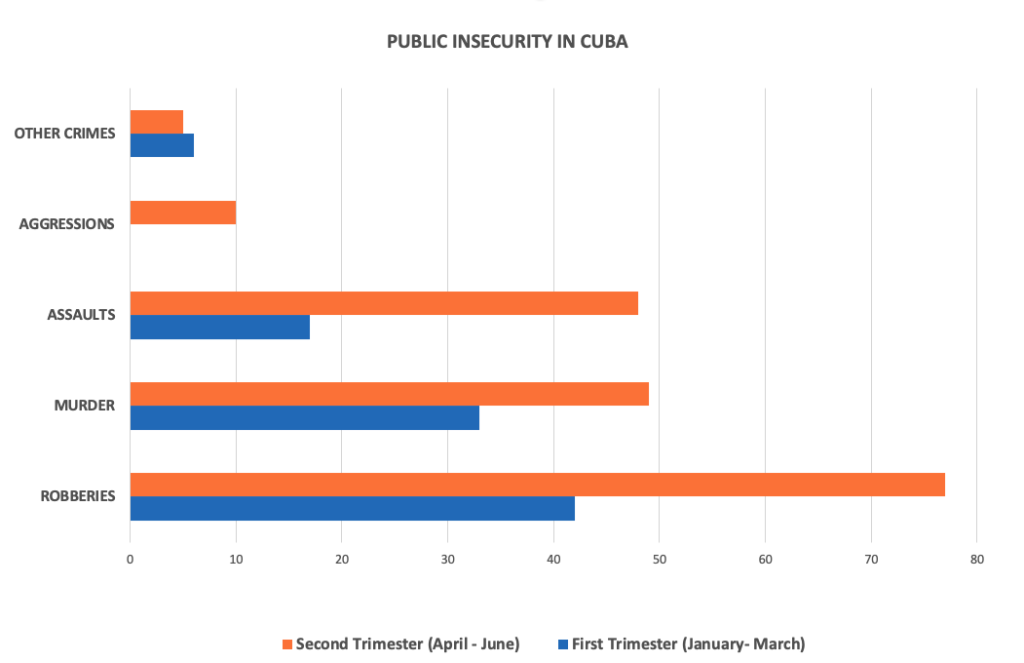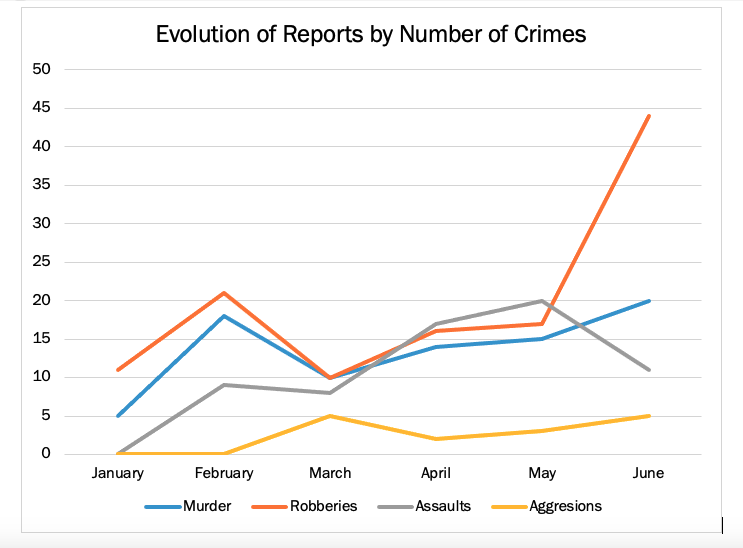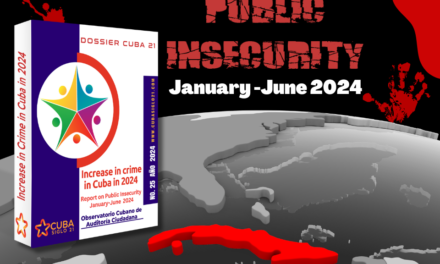Download Report PDF in English
Download Report PDF in Spanish
SUMMARY
The Cuban Citizen Audit Observatory (Observatorio Cubano de Auditoría Ciudadana, OCAC) has published an analysis of the breakdown of public security in Cuba. The report monitors data from the first half of this year and analyzes the growing public insecurity and the escalation of violent crime in the country. OCAC points out that public security is only one of the aspects of citizen security, as it includes several indicators such as food, health, energy security, among others.

Public insecurity is manifested through a significant increase in crimes and offenses. The Cuban Observatory of Citizen Audit identified 98 verified reports in the first quarter: 16 in January, 48 in February and 34 in March. Of these, 42 were robberies, 33 murders, 17 assaults and 6 other types of crimes. The report notes that during the second quarter of 2023 there were 189 reports of crimes, including robberies, murders, assaults, and assaults. The provinces most affected in the second quarter were Havana, Villa Clara, and Guantanamo.
OCAC considers very relevant the comparison of quarterly behavior where crimes practically doubled from one quarter to the other, from 98 to 189 (for a 92% increase). Of these, robberies grew by 83% (77 versus 42) and murders by 43% (49 versus 33). Another fact to consider is that the highest increase occurred in June, which could indicate that an escalation of criminal acts is expected in the coming months.

The figures provided in this report may seem low to some readers when compared to other countries. However, if one takes into consideration the government’s lack of transparency in the handling of statistics, the recent intensification of propaganda extolling the supposed efficiency of police work, as well as the research conducted by CubaData which states that 61% of Cubans surveyed said they had been victims of violence or acts of crime -but that only 14.6% of them reported it to the police-, it can be stated without fear of doubt that the figures offered in the report may, in reality, be much higher.
One of the most salient aspects of the report is the normalization of physical violence in the commission of crimes, even in situations where no significant material benefits are obtained by the delinquents. This suggests the presence of profound psychological damage in the case of the perpetrators.
The report also highlights the involvement of minors as victims and perpetrators in several cases. The existence of criminal gangs is a worrying indicator of the social decomposition and insecurity prevailing in society.
Public insecurity in Cuba is not a superficial or isolated problem, but a reflection of deeper structural problems. The lack of investment in basic services such as food, health, education, and housing, as well as structural and cultural violence, contribute to the escalation of public insecurity.
OCAC emphasizes that addressing public insecurity cannot be limited to punitive measures. A comprehensive approach is needed that addresses the underlying causes, such as the lack of investment in basic needs, not only in food and health, but also in resources for the police specialized in criminology. The investment priority has been so far in the sections of the Ministry of the Interior (MININT) that face public protests and demonstrations against the government, the so-called black berets. The Cuban oligarchy and its government strengthens State Security at the expense of Citizen Security and public safety. For them the concept of security is oriented to the protection of their absolute power to protect their interests as a dominant group.

OCAC points out that public security is only one of the aspects of citizen security, as it includes several indicators such as food, health, energy security, among others.
The current precarious situation demands a response to improve the quality of life of the population.
In addition, the report highlights the importance of auditing and reforming key institutions such as Grupo de Administración Empresarial S.A. (GAESA), whose resources should be redirected towards development and social welfare rather than benefiting an oligarchy.
The Cuban Observatory of Citizen Audit calls for reflection and action on the challenges of citizen security in Cuba. The solution lies not only in addressing public insecurity, but in confronting the structural and systemic problems that underlie it.
To access the full Report in English
To Access the full Report in Spanish







